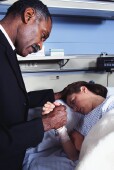- Could Your Grocery Store Meat Be Causing Recurring UTIs?
- Are You Making This Expensive Thermostat Error This Winter?
- Recognizing the Signs of Hypothyroidism
- 10 Strategies to Overcome Insomnia
- Could Artificial Sweeteners Be Aging the Brain Faster?
- Techniques for Soothing Your Nervous System
- Does the Water in Your House Smell Funny? Here’s Why
- Can a Daily Dose of Apple Cider Vinegar Actually Aid Weight Loss?
- 6 Health Beverages That Can Actually Spike Your Blood Sugar
- Treatment Options for Social Anxiety Disorder
Many Americans May Get Hospice Care Too Late


Of the more than 1.5 million patients who received hospice care in the United States in 2013, one-third died within one week of getting it, a new report shows.
“While many dying Americans are opting for hospice care at the end of their lives, far too many receive care for a week or less. We need to reach patients earlier in the course of their illness to ensure they receive the full benefits that hospice and palliative care can offer,” J. Donald Schumacher, president and CEO of the National Hospice and Palliative Care Organization, said in a news release from the organization.
In the new report, the organization examined the growth, delivery and quality of hospice care in the United States. The findings were presented in Nashville recently at a meeting of hospice and palliative care professionals.
The investigators found that 34.5 percent of hospice patients received care for seven days or less, while half of hospice patients received care for less than 18 days. Of all hospice care, 66 percent was provided where patients lived, including private homes, residential facilities or nursing homes.
The report authors noted that 91 percent of hospice care in 2013 was covered by the Medicare Hospice Benefit.
Meanwhile, the report revealed that most hospice patients had conditions other than cancer. “A common misconception is that hospices care predominantly for people with cancer,” said Schumacher.
The researchers found that 63 percent of the people who received hospice care were not cancer patients and had other illnesses, such as dementia, heart disease, lung disease, stroke or kidney disease.
Research presented at meetings is considered preliminary until it is published in a peer-reviewed medical journal.
More information
The U.S. National Library of Medicine has more about hospice care.
Source: HealthDay
Copyright © 2026 HealthDay. All rights reserved.










